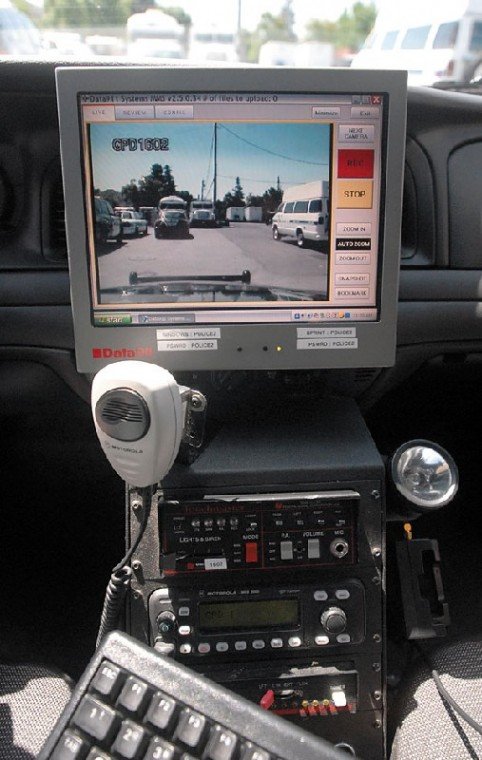Gilroy
– City officials have opted to phase in new computers to replace
dysfunctional units installed in Gilroy police cruisers, at roughly
$14,000 a pop.
Gilroy – City officials have opted to phase in new computers to replace dysfunctional units installed in Gilroy police cruisers, at roughly $14,000 a pop. Two new cruisers will soon be fitted with the systems. Over the next four years, as cars are replaced and computers age, technicians will swap in the new Data911 systems for the SecureEye computers, which have now failed two 60-day trials, putting SecureEye’s contract at risk.
The SecureEye systems have frustrated officers, who complain of blinking screens, drained batteries and software errors while patrolling Gilroy streets. Police use the car-mounted computers to look up vehicle registrations and arrest warrants from the road, freeing emergency dispatchers from fetching the data. Not every computer has failed, but the current systems have proven more expensive than effective: More than $50,000 has been spent on computer-related repairs and replacements, and the city has already paid out nearly three-fourths of its $684,559 contract with the Lynnwood, Washington-based company.
If the computers fail a final 60-day test, which began April 10, the city could ask SecureEye to remove the systems and repay the city in full. Currently, the city is withholding more than $260,000 in payment and maintenance money, waiting on the results of the final test. SecureEye’s errors cast a shadow over city council’s discussion of the new Data911 computers last month. As Mayor Al Pinheiro opened the issue to questions, Dion Bracco asked, “Do we know these work?”
City Administrator Jay Baksa assured council that the new systems, made by Data911 Mobile Computer Systems in Alameda, were thoroughly tested and researched by city staff. Seventeen officers tested either the Data911 computers or a competitor, made by Panasonic. Of the seven officers who tested both, six preferred the Data911 model, citing its crisp, bright screen and compact design.
“It fits in the dash pretty naturally, and the video camera is much smaller [than Panasonic’s] and it fits up behind the rear-view mirror, not causing a blind-spot issue for officers,” said Sgt. Jim Gillio, a member of the four-person team that evaluated the computers. “Plus, logging on is much simpler than with the Panasonic.”
The computers are widely used in Northern California, added Gillio, including in Morgan Hill, where police began installing them a year ago. Morgan Hill police plan to finish installing the computers in all cruisers by July, said Commander David Swing.
“They’ve increased our ability to do pro-active stuff,” such as checking license plates, said Swing, “and helped us limit our radio traffic.”
City staff explicitly sought vendors who had installed more than 1,000 working computers, said David Chulick, Gilroy’s IT director, and visited other agencies to check the computers’ performance. Gilroy firefighters also have been using Data911 systems, minus the camera systems used by police, in fire rigs and chief’s cars to transmit information about fires and medical emergencies. Chief Dale Foster said the Data911 computers have only been partially implemented since January, but “they appear to be working fine,” compared to other, older models that malfunctioned.
Data911 offers a three-year warranty on the computer and a one-year warranty on its video components, with the option of purchasing additional years at an added cost. According to Data911’s proposal, the city will pay 80 percent of its contract when all computers are installed, an additional 10 percent when computer training is complete, and the last 10 percent when the units pass muster with the city.
The Data911 computers’ track record sold Bracco.
“There’s been no issues with this one,” he said. “I believe they’re a proven product.”
In addition, each Data911 computer is $800 cheaper than a Panasonic, noted Chulick.
“This was not done in a vacuum,” said Chulick. “We vigorously went through and tested both solutions, and both solutions did extremely well. The officers selected one” – Data911 – “over the other.”
It’s unclear whether the process used to select the Data911 computers differed from that used to select SecureEye. Both Gillio and Chulick said they weren’t involved in choosing SecureEye computers in 2004. Capt. Scot Smithee, who took over the project from recently-retired Capt. Jack Robinson, did not return calls Tuesday. In a January interview, Smithee said officer feedback on the SecureEye systems was positive when the computers were first tested, and was unsure when the errors first cropped up.
City repair orders reveal persistent problems with the SecureEye systems. “Died/computer-related” reads one 2005 repair order, which was fixed with a few hours of repairs and a $70 replacement battery, for a total cost of $186.22. Multiple orders cite “SecureEye wiring” as the cause of electrical and radio failures. “Find new wire work and engine compt. battery unacceptable. Had to cut apart work and re-crimp,” wrote one technician. In one case, one-day-old SecureEye wiring failed, blowing a fuse under the car’s hood. “Release to SecureEye for repairs,” the order reads.
The computers also drained the cars’ batteries, causing the systems to shut down. Originally, police tried to solve the problem by upgrading their batteries, at a total cost of $21,600. But the systems also shorted alternators. One January 2006 order reads “2nd Alt[ernator] Failure – SecureEye.” In some cases, SecureEye repairs actually damaged other systems: Dashboard lights failed on one cruiser after SecureEye worked on the car.
Mobile computers are generally expected to last three or four years, said Chulick, which means the SecureEye systems will likely be replaced within the next year. As the SecureEye models are retired, technicians will replace them with the Data911 systems approved by Council. Gillio said the systems operate interchangeably with the Tiburon Computer Aided Dispatch system used by the emergency dispatchers, and the transition shouldn’t cause problems.
For Gilroy officers, “there’s not a whole lot that’s going to be different,” said Gillio.
Except, they hope, for the problems.















